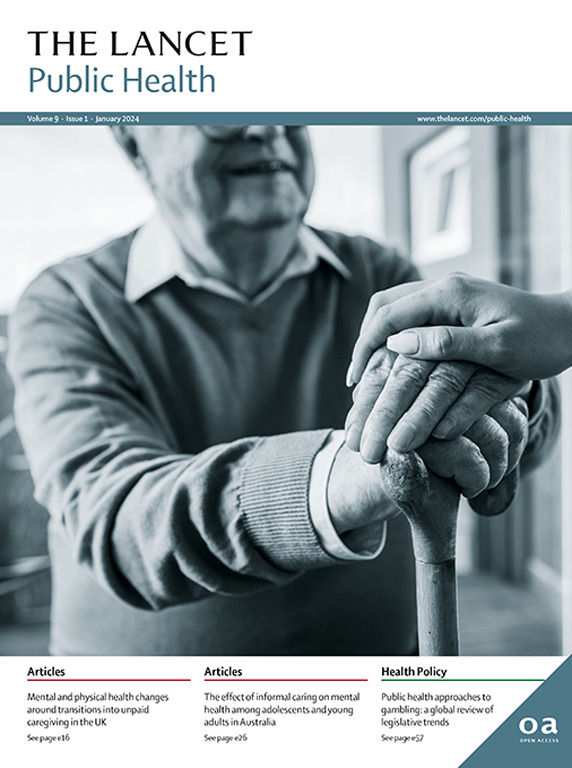Prevalence of severe mental illness among people in prison across 43 countries: a systematic review and meta-analysis
IF 25.2
1区 医学
Q1 PUBLIC, ENVIRONMENTAL & OCCUPATIONAL HEALTH
引用次数: 0
Abstract
Background
Prison populations have been increasing worldwide. Previous studies suggest that there is a high burden of psychiatric morbidity in people in prison, but, to our knowledge, the last published meta-analysis of prevalence is more than a decade old. We aimed to describe the pooled prevalence of depression, psychosis, bipolar disorder, and schizophrenia spectrum disorders for people who are incarcerated.Methods
In this updated systematic review and meta-analysis, we searched six databases and grey literature published from database inception until Aug 8, 2024, with no language or geographical restrictions. We included primary quantitative studies that reported the prevalence of depression and psychotic disorders in the unselected prison population, based their diagnoses on clinical examination or from interviews and by the use of validated diagnostic instruments, met standardised criteria of the ICD or the Diagnostic and Statistical Manual of Mental Disorders for the diagnoses, and provided pooled prevalences for psychosis in the previous 6 months and clinical depression in the previous 2 weeks to 1 month. We excluded studies that used selected samples or were only qualitative. We investigated bipolar and schizophrenia spectrum disorders as separate diagnostic subcategories. We synthesised studies using random-effects meta-analysis and explored heterogeneity with meta-regression and subgroup analyses. The protocol is registered with PROSPERO, CRD42022378568.Findings
We identified 131 publications reporting the prevalence of mental illness in 58 838 people in prison in 43 countries. We estimated that the prevalence of depression was 12·8% (95% CI 11·1–14·6) and for any psychosis was 4·1% (3·6–4·7). For diagnostic subcategories, we found that the prevalence of bipolar disorder was 1·7% (1·0–2·6) and schizophrenia spectrum disorders was 3·6% (1·3–7·1). Between-study heterogeneity was substantial for these estimates (I2 69–97%) with few explanations. However, subgroup analyses revealed that people in prison in low-income and middle-income countries had higher prevalences for depression (16·7% [95% CI 13·6–20·0]) than in high-income countries (10·8% [9·0–13·0]), and that, for people with psychosis who are incarcerated, psychiatrists were less likely to diagnose (3·5% [2·8–4·3]) than were non-psychiatrists (4·7% [3·9–5·5]).Interpretation
Our study indicates that the prevalence of severe mental illness in people who are incarcerated worldwide is considerable. Meeting the treatment needs of people in prison who have mental ill health remains an ongoing challenge for public mental health. More evidence on how to improve the assessment, treatment, and linkage to services on release, which will require more research-friendly prison services, is now needed.Funding
None.43个国家服刑人员中严重精神疾病的流行情况:系统回顾和荟萃分析
世界范围内的监狱人口一直在增加。先前的研究表明,监狱里的人有很高的精神疾病负担,但是,据我们所知,最近发表的关于患病率的荟萃分析是十多年前的事了。我们的目的是描述被监禁者的抑郁、精神病、双相情感障碍和精神分裂症谱系障碍的总体患病率。方法在这项更新的系统评价和荟萃分析中,我们检索了6个数据库和从数据库建立到2024年8月8日发表的灰色文献,没有语言和地理限制。我们纳入了一些初步的定量研究,这些研究报告了未被选中的监狱人口中抑郁症和精神障碍的患病率,这些研究基于临床检查或访谈,并通过使用有效的诊断工具进行诊断,这些诊断工具符合《精神疾病诊断与统计手册》(ICD)的标准化标准。并提供了前6个月的精神病患病率以及前2周到1个月的临床抑郁症患病率。我们排除了使用选定样本或仅定性的研究。我们将双相情感障碍和精神分裂症谱系障碍作为单独的诊断亚类别进行研究。我们使用随机效应荟萃分析综合研究,并使用荟萃回归和亚组分析探讨异质性。协议注册号为PROSPERO, CRD42022378568。研究结果:我们确定了131份出版物,报告了43个国家5838名监狱在押人员中精神疾病的流行情况。我们估计抑郁症的患病率为12.8% (95% CI 11.1 - 14.6),任何精神疾病的患病率为4.1%(3.6 - 4.7)。对于诊断亚类,我们发现双相情感障碍的患病率为1.7%(1.0 - 2.6),精神分裂症谱系障碍的患病率为3.6%(1.3 - 7.1)。这些估计的研究间异质性很大(i69 - 97%),但解释很少。然而,亚组分析显示,低收入和中等收入国家监狱中的人患抑郁症的患病率(16.7% [95% CI 13.6 - 20.0])高于高收入国家(10.8%[9.0 - 13.0]),而且,对于被监禁的精神病患者,精神病医生的诊断可能性(3.5%[2.8 - 4.3])低于非精神病医生(4.7%[3.9 - 5.5])。我们的研究表明,世界范围内被监禁者中严重精神疾病的患病率相当高。满足监狱中患有精神疾病的人的治疗需要仍然是公共精神卫生面临的一项持续挑战。现在需要更多的证据来证明如何改善评估、治疗以及与释放服务的联系,这将需要更多有利于研究的监狱服务。
本文章由计算机程序翻译,如有差异,请以英文原文为准。
求助全文
约1分钟内获得全文
求助全文
来源期刊

Lancet Public Health
Medicine-Public Health, Environmental and Occupational Health
CiteScore
55.60
自引率
0.80%
发文量
305
审稿时长
8 weeks
期刊介绍:
The Lancet Public Health is committed to tackling the most pressing issues across all aspects of public health. We have a strong commitment to using science to improve health equity and social justice. In line with the values and vision of The Lancet, we take a broad and inclusive approach to public health and are interested in interdisciplinary research.
We publish a range of content types that can advance public health policies and outcomes. These include Articles, Review, Comment, and Correspondence. Learn more about the types of papers we publish.
 求助内容:
求助内容: 应助结果提醒方式:
应助结果提醒方式:


